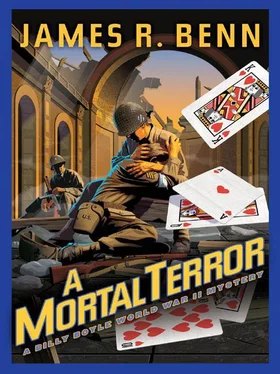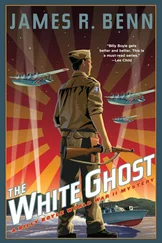James Benn - A Mortal Terror
Здесь есть возможность читать онлайн «James Benn - A Mortal Terror» весь текст электронной книги совершенно бесплатно (целиком полную версию без сокращений). В некоторых случаях можно слушать аудио, скачать через торрент в формате fb2 и присутствует краткое содержание. Жанр: Шпионский детектив, на английском языке. Описание произведения, (предисловие) а так же отзывы посетителей доступны на портале библиотеки ЛибКат.
- Название:A Mortal Terror
- Автор:
- Жанр:
- Год:неизвестен
- ISBN:нет данных
- Рейтинг книги:5 / 5. Голосов: 1
-
Избранное:Добавить в избранное
- Отзывы:
-
Ваша оценка:
- 100
- 1
- 2
- 3
- 4
- 5
A Mortal Terror: краткое содержание, описание и аннотация
Предлагаем к чтению аннотацию, описание, краткое содержание или предисловие (зависит от того, что написал сам автор книги «A Mortal Terror»). Если вы не нашли необходимую информацию о книге — напишите в комментариях, мы постараемся отыскать её.
A Mortal Terror — читать онлайн бесплатно полную книгу (весь текст) целиком
Ниже представлен текст книги, разбитый по страницам. Система сохранения места последней прочитанной страницы, позволяет с удобством читать онлайн бесплатно книгу «A Mortal Terror», без необходимости каждый раз заново искать на чём Вы остановились. Поставьте закладку, и сможете в любой момент перейти на страницу, на которой закончили чтение.
Интервал:
Закладка:
“No, and if we do not, we may have to let them go. It could be a coincidence, after all.”
“Can we look around?” Flint asked.
Luca gave commands in Italian and one of his men led us inside, where other Carabinieri were ransacking the joint. In the kitchen, two officers had the farmer seated at his kitchen table. He had a stern face, his thick black hair peppered with gray. He wore a work shirt and vest; his hands were rough and callused. On the wall, a rectangular patch of dark wallpaper showed where Mussolini’s portrait had probably hung until the invasion.
The Carabinieri were throwing rapid-fire questions at him, to which he shook his head repeatedly. They seemed frustrated. He looked calm and haughty, as if he knew his secret was safe. He was a good actor, but then Mussolini and his bunch were pretty theatrical.
Flint moved closer, edging the officers out of the way. He reached into his pocket, and the farmer flinched. But he pulled out a pack of cigarettes, and the fellow relaxed. Flint offered one, and lit it for him.
“ Nome? ” Flint asked, smiling as he clicked his Zippo shut.
“Frederico Pazzini,” he said, giving a slight bow of his head, before taking a deep drag on his Lucky.
Before he could exhale, Flint struck him on the cheekbone with the butt of his. 45, hard. Blood spurted onto the table, and Frederico choked on smoke and blood as Flint shook off the two Carabinieri who tried to pull him away. He grabbed Frederico’s arm and held it to the table, the muzzle of his automatic pressed into the palm of one callused hand. He thumbed back the hammer, and spoke one word.
“Radio?”
Frederico shook his head, but with fear in his eyes this time. The two officers stepped back, apparently liking what they saw, or at least the fact that someone else was doing it for them. I wondered how far Flint was going to take it. Myself, I was ready to shoot the other hand, images of the dead and wounded still fresh in my mind.
But Flint didn’t shoot. He released Frederico, smiled, and shrugged his shoulders. Then he pointed outside, and simply said, “Signora Pazzini.” We hadn’t taken two steps when Frederico began bawling and pointed to a cupboard near the sink. The officers got down on their knees and pulled out cans of olive oil, tins of flour, and some large bowls. Then they pried up the floorboards, and lifted out a radio. Under one of the dials was the word Frequenzeinstellung.
That told us all we needed to know. Flint hit him again, on the other cheekbone, then wiped his. 45 with a dishrag, and left. Under the floor, where the radio had been hidden, was the portrait of Il Duce.
The Pazzini family was hauled away in a truck, their little girl in tears at the sight of her father’s face. I felt bad for her. I felt bad for the little girls back in the States who’d be crying when they heard their fathers were dead, killed in a field outside Anzio. I felt bad all around.
“What will happen to them?” I asked Luca as he halfheartedly searched through the house.
“They will be sent back to Naples. A trial for the father, perhaps a displaced persons camp for the woman and children.”
“He must have been a die-hard Fascist.”
“Many of these people are. You know Mussolini settled this area with them. They hate you, and they hate us more for fighting with you.” He tossed a pile of books off a chair and sat.
“Must be hard,” I said, taking a chair myself.
“At first I looked forward to this assignment. I thought we would be bringing law and justice here. But instead, now that General Lucas is not moving inland, we have received orders to remove all civilians.”
“Everyone?”
“Yes. First we have to track down the remaining Fascist spies and make sure they do not escape. Then all nonessential civilians will be shipped back to Naples. The entire Anzio-Nettuno area, evacuated. For their safety, the general said. Because of the bombing.”
“He’s right, you know. Especially now that the Germans won’t have observers in our midst. The shelling is not going to be as accurate. Good news for us, bad news for civilians.”
“Yes, yes. But I did not expect to spend this war putting civilians in camps, for both sides, no less.”
“It’s not quite the same, Luca.”
“No, but neither is it combat, where a man can be tested. What shall I tell my children? That I helped run a concentration camp, then worked for a capitano who was corrupt, before evicting thousands of Italians from their homes?”
“What happened, Luca? On Rab?”
“You have to understand, when the camp was first set up, it was to house partisan prisoners. Tito’s Yugoslav Partisans fought us and the Germans everywhere. The Nazis and the Fascists treated the Yugoslavian people horribly, shooting civilians without provocation. It quickly descended into bloodthirsty reprisals. The decision was made to remove many of the local Croats and Slovenes and bring in Italians, to repopulate the area. So the camp expanded, with thousands of local civilians, whole families, brought in. Soon we had over fifteen thousand, living in tents. Many grew sick and starved. When the commander of our battalion complained, saying that this mistreatment only drove more people to support the partisans, conditions improved, somewhat.” He grew quiet, surveying the wreckage of the living room, one of many he must have seen in his strange career.
“But then?”
“Then the order came for all Yugoslavian Jews to be interned. About three thousand were brought into the camp.”
“To be killed?”
“No, no, not at all. We followed the orders of our government, but the army insisted that the Jews be well treated, not as a hostile force. They weren’t fighting us; they were only peaceful people who’d been swept up in this madness. So they were put in a separate part of the camp, and provided with what comfort we could give. My commander told me it was the only way to preserve a shred of honor. We had to obey the German commands and the orders from Il Duce, but we could at least do so with some dignity.”
“I didn’t know, Luca.”
“No, and not all camps were the same. In some, Jews were treated terribly. But on Rab, we did what little we could. We were sick of fighting the partisans and all the hatred. It felt good to do something halfway decent.”
“What happened?”
“After the fall of Mussolini, orders came from the government that the Jews were to be released. For their own safety, they could remain in the camp voluntarily under our protection. Several hundred left to join the partisans, and many others were taken to partisan-controlled territory. At this point, we had an uneasy truce with the Yugoslavs, and worried more about our former German allies.”
“All the Jews got out?” I knew this story wasn’t going to have a happy ending.
“No. There were two hundred elderly and sick left in the camp. My battalion was ordered back to Italy after the armistice, and I was in charge of a detachment, which was to close the camp. The last of the Slovene and Croat prisoners were released, and I was trying to find medical care for those Jews who could not travel.”
We sat in silence, and I could hear the low murmur of other Carabinieri in the yard and smell their cigarette smoke as they waited for Luca.
“There was none. No transport, no fuel. A German column approached the camp, several hundred men in armored vehicles. We were but a few dozen, with nothing more than rifles. I gave the order. We ran. We ran away, leaving two hundred innocents behind. The Germans took them. I heard later they were sent to a camp in Poland. I expect they are all dead, don’t you?”
“Yes, I do.” I didn’t expect they were dead, I knew it. From Zyklon B, probably in a place called Auschwitz. It had all been hard to believe when Diana told me Kurt Gerstein’s story in Switzerland, which seemed like another world, another time. But here it was, half a continent away. How large was this killing machine, that it would send an armored column to a little island in the Adriatic, and ship two hundred old and sick Jews to Poland? It made no sense. Of course, in a world where people were killed with assembly-line precision, nothing could make sense.
Читать дальшеИнтервал:
Закладка:
Похожие книги на «A Mortal Terror»
Представляем Вашему вниманию похожие книги на «A Mortal Terror» списком для выбора. Мы отобрали схожую по названию и смыслу литературу в надежде предоставить читателям больше вариантов отыскать новые, интересные, ещё непрочитанные произведения.
Обсуждение, отзывы о книге «A Mortal Terror» и просто собственные мнения читателей. Оставьте ваши комментарии, напишите, что Вы думаете о произведении, его смысле или главных героях. Укажите что конкретно понравилось, а что нет, и почему Вы так считаете.












